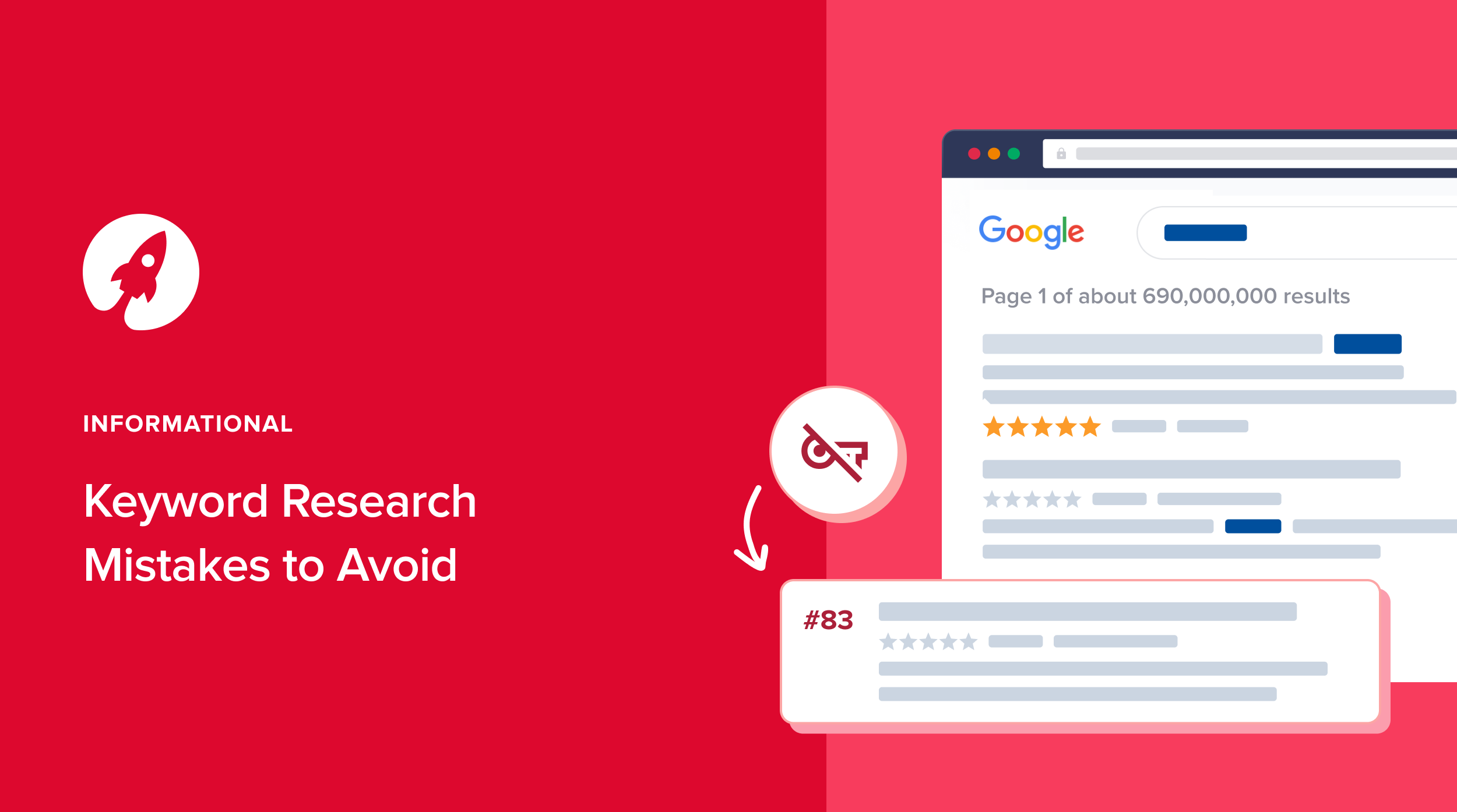If you want a content strategy that impresses both the users and the search engines, you must master keyword research first and avoid keyword research mistakes.
Searchers actively use search engines to get information or make a purchase. This is why keyword research is important in developing your SEO strategy.
And thorough keyword research involves more than just tossing some words together; it involves understanding the audience’s motivations, your competition’s performance, and the search engine’s algorithm.
That’s why it’s essential to approach it with strategic planning. So, to do proper keyword research for Search Engine Optimization, you must avoid common keyword research mistakes.
In this guide, I will discuss the 10 most common keyword research mistakes I’ve seen people making.
In This Article
- 1. Ignoring Search Intent
- 2. Ignoring User Intent
- 3. Keyword Stuffing
- 4. Targeting Overly Broad Keywords
- 5. Missing SEO Guidelines
- 6. Confusing Singular vs Plural Keyword Usage
- 7. Ignoring Competition and Keyword Difficulty
- 8. Not Using the Right Keyword Research Tool
- 9. Focusing on One Keyword Only
- 10. Not Analyzing Ranking
- Final Word
- FAQs
1. Ignoring Search Intent
Search intent refers to the reason behind a search query and typically involves users looking for solutions or to make a purchase.
The internet is for everyone, which means that you’ll have people searching things for information. You’ll also have potential customers likely interested in various aspects of your product or service.
For example, if you run an online content marketing agency, people can visit your website for many different purposes. They can click on it to read your blog, review your pricing, or sign up for your services.
This is why it’s important to understand search intent.
By ignoring search intent, you miss the opportunity to connect with potential customers actively looking to make a purchase.
2. Ignoring User Intent
User intent is all about understanding what exactly your audience wants.
A close cousin to search intent, user intent is about going beyond the search terms and getting into your audience’s mind. This means understanding their motivations and goals for performing the search.
Ignoring user intent might result in irrelevant content that doesn’t engage your audience or rank high in search results.
When considering user intent for a given keyword, it’s important to consider the following:
- People looking for when they search this keyword
- What type of person is searching for this?
- What information is valuable to them?
Use these questions to help you create a better keyword map for your content.
You can use SEOBoost’s Topic Reports feature to map out useful phrases and keywords that can help you capture the user intent perfectly.
3. Keyword Stuffing
Keyword stuffing is excessively cramming keywords into content to manipulate search engine rankings. It is one of the most common keyword research mistakes.
It might involve inserting a given keyword repeatedly across content, including in headings, paragraphs, and image alt tags, without paying attention to readability or user experience.
Keyword stuffing can make your website read awkwardly or unnaturally, and visitors may perceive it as spammy.
More importantly, search engines often penalize sites for keyword stuffing, causing them to rank lower in search results.
To avoid keyword stuffing, I use SEOBoost’s content optimization feature, which allows me to use the right keywords the right number of times. It also flags errors for phrases, words, and on-page elements that should be optimized.

4. Targeting Overly Broad Keywords
Overly broad keywords might initially seem attractive due to their high search volume. However, targeting overly broad or high-volume keywords without context often leads to fierce competition and low conversion rates.
These keywords typically lack specificity, making it difficult for audiences or potential customers to find your unique offering.
Focusing on more specific topics or using a long-tail keyword strategy can attract a more engaged audience and improve your chances of ranking higher in search results.
SEOBoost’s Topic Reports feature helps you select the right keyword by identifying the top-ranking ones and highlighting the competitive use.
5. Missing SEO Guidelines
Having SEO guidelines in place is integral to the success of your digital marketing efforts. Search engines have specific algorithms and criteria for ranking websites. That is why it is crucial to incorporate optimization strategies into every stage of the content creation process, from ideation to publication.
SEO guidelines also ensure that you include relevant keywords in your headings, meta tags, and image descriptions. This way, your well-crafted content will be discoverable by audiences interested in what you offer.
To ensure you create optimized content, start by briefing your content on SEOBoost. The features help you add relevant terms, phrases, questions, and headings from top SERPs. Later, when you have finished writing the content, use the Content Optimization feature to identify the errors and work on improvements.
You can add as many optimization reports as you want; organizing them is super easy, too!

Adding SEOBoost to your content creation process will cut through time and help you create content that aligns with your overall marketing strategy.
6. Confusing Singular vs Plural Keyword Usage
While singular and plural variations of keywords may seem similar to humans, to a search engine, they are completely different words reflecting different user intents.
Optimizing an online course offering, for example, with just “online course,” overlooks the plural variation “online courses,” which may have a significant search volume and user intent, especially among those exploring multiple course options.
While conducting keyword research, remember to identify both singular and plural variations relevant to your content.

7. Ignoring Competition and Keyword Difficulty
If you were running a marathon for the first time, it wouldn’t make sense to compete at a professional level, would it?
All your hard work and training would be futile compared to professional athletes running their entire lives.
The same can be said for your SEO keyword strategy.
By optimizing solely for highly competitive keywords, your website might struggle to compete against established industry giants with higher domain authority and more comprehensive backlink profiles.
Ignoring competition and keyword difficulty leads to frustration and poor performance, as your site fails to gain traction in search results despite your optimization efforts.
By conducting competitor analysis and evaluating keyword difficulty, you can identify opportunities where you have a realistic chance of ranking well and driving valuable organic traffic to your website.
8. Not Using the Right Keyword Research Tool
A good keyword research tool equips you with the expertise needed to stand out in digital noise, from uncovering trending queries to analyzing competitor strategies. However, relying on inadequate or unreliable tools can lead to incomplete keyword lists, inaccurate search volume estimates, and missed opportunities.
This is why I use SEOBoost for keyword mapping. The Topic Reports feature allows me to view the top-ranking keywords used by the competition. It also helps identify the optimal use case for certain keywords, which helps me create content that matches both user and search engine expectations.

9. Focusing on One Keyword Only
While targeting specific keywords is essential for SEO, focusing solely on one keyword can be limiting and ineffective. Relying on a single keyword narrows your potential reach and may not adequately capture the diverse range of search queries used by your target audience.
Additionally, putting all your efforts into ranking for one keyword can lead to missed opportunities to target related keywords with high search volume and lower competition.
Remember, if keywords are your audience’s treasure map to find you, giving them more than one avenue is important. If you were opening a physical store, for example, you would want it in a central location that intersects many roads and is accessible via multiple routes.
To maximize your SEO efforts, aim for a diverse keyword strategy that covers a variety of relevant terms and phrases related to your content or business.
With SEOBoost’s Topic Reports feature, you get a report on all the relevant phrases and terms that can be used with your focus keyword.
10. Not Analyzing Ranking
Effective keyword research doesn’t end once you’ve selected your target keywords. It’s important to continuously track and analyze the performance of your chosen keywords to assess their effectiveness and identify areas for improvement.
Neglecting to monitor your keyword rankings means missing out on valuable insights into your website’s performance in search results. By tracking your keyword rankings over time, you can identify trends, assess the impact of algorithm updates or changes to your website, and adjust your SEO strategy accordingly.
Analyzing ranking data allows you to identify keywords performing well and those that may require optimization, helping you prioritize your efforts and maximize your visibility in search engine results pages (SERPs).
Final Word
To streamline your keyword research efforts, consider investing in a comprehensive SEO tool that handles everything so you don’t have to. Tools like SEOBoost offer features for on-page optimization, competitor analysis, and real-time recommendations. This way, you’ll have a consultant and research tool at your fingertips, all in one convenient WordPress plugin.
Sign up for SEOBoost today and test your keyword strategy using our 14-day free trial.
FAQs
What are the common keyword research mistakes in SEO?
Common SEO mistakes include keyword stuffing, neglecting mobile optimization, lack of quality content, ignoring on-page SEO, poor backlink strategy, slow page speed, and not tracking analytics.
What is improper keyword usage?
Improper keyword usage refers to using keywords in a way that is unnatural, excessive, or irrelevant to the content’s context. This includes keyword stuffing or using keywords that do not align with the content’s topic or user intent.
What keyword research mistakes do many SEOs make when choosing target keywords?
Many SEOs prioritize high-volume keywords over relevancy and user intent. Focusing solely on search volume can increase competition and lower conversion rates. Effective keyword selection balances search volume, relevance, and competition to maximize SEO impact.




